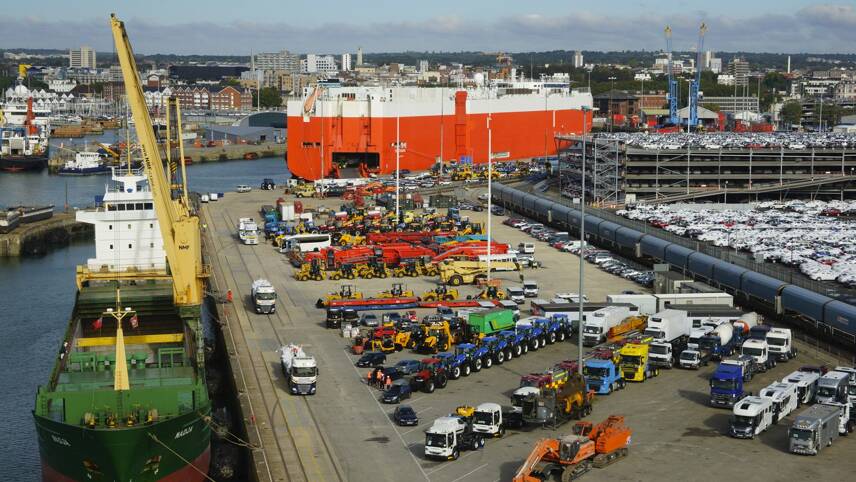Register for free and continue reading
Join our growing army of changemakers and get unlimited access to our premium content

The call to action is being made by the Association for Renewable Energy and Clean Technology (REA), through a new report co-published this week by the association and Hitachi Energy.
The report uses Southampton and the Solent as a case study, looking at the economic benefits of decarbonising transport in line with the UK’s legally binding 2050 net-zero target and interim carbon budgets. This region was selected as it serves as a major hub for transport by sea, as well as by air and for long-distance road transport.
At present, transport provides £6bn of gross value added (GVA) to the region’s local economy each year. This amount could increase to £8bn by 2030, the report concludes – but only if transport decarbonisation is accelerated. If it is not, it risks losing benefits to other UK ports or other ports in other countries which have decarbonised more rapidly.
The report argues that many regions outside of London are currently facing a similar juncture, with the potential to unlock millions or even billions of investment and public benefits by accelerating their low-carbon transport plans. Yet this value will decrease and fail to be realised without more support at a policy level, the REA concludes.
Policy snapshot and recommendations
2020 lockdowns aside, transport has been the UK’s highest-emitting sector since 2016. Surface transport – road and rail – is the biggest contributor to the sector’s emissions and, in 2019, accounted for 23% of the UK’s total annual emissions. Absolute emissions from surface transport will need to fall by 70% by 2035 if the UK is to meet its climate targets.
The REA report outlines how the Climate Change Committee (CCC) is forecasting that decarbonising domestic surface transport alone will require £250bn+ of investment through to 2050, from a mix of public and private sources. The UK Government’s Transport Decarbonisation Plan, in contrast, has an ambition of mobilising £220bn of investment through 2030, across all modes of transport.
Beyond increasing the top-level ambitions for financing the UK’s low-carbon transport transition, the REA report sets out a series of recommendations for policymakers in central Government. REA chief executive Nina Skorupska said that the Government needs to build on the overarching Transport Decarbonisation Plan with the provision of “a consistent framework, guidance and resources to local areas so they can produce transport decarbonisation plans.”
Local transport decarbonisation plans, the report states, should be “integrated”, covering the whole transport and energy system locally, backed with sufficient investment from central government and supported by robust public engagement plans. Councils should also be able to be held to account over the delivery of the plans, with clear governance structures.
Some local authorities have already been calling on the UK Government to mandate the creation of net-zero transition plans from councils. The Government is notably mandating the creation of such plans by large businesses in high emitting sectors from 2023.
Councils and related groups have also repeatedly called on the UK Government to ensure that local authorities have access to more funding and more resources to create and deliver these plans. A recent survey by Cluttons found that seven in ten UK councils are struggling to finance their net-zero plans.
The REA report goes on to implore the Government to ensure that energy infrastructure is sufficient in all regions to support the uptake of electrified transport. Production increases and distribution networks will also need to be planned for alternative fuels.
Global EV outlook
The REA report has been published in the same week that the International Energy Agency (IEA) released its latest annual Global Electric Vehicle (EV) Outlook.
The Outlook confirms that a record 6.6 million new electric cars were sold in 2021 when pure-electric and hybrid car sales were accounted for. This figure was more than double the 2020 level of sales. The IEA has noted that public spending on EV subsidies and incentives doubled between 2020 and 2021 to reach more than $29bn.
And, in the first quarter of 2022, two million new electric cars were sold globally. This represented a 75% increase in sales compared with the first quarter of 2021. Sales growth was the strongest in Europe and China during 2021 and the first quarter of 2022, according to the IEA.
“Few areas of the new global energy economy are as dynamic as EVs,” said the IEA’s executive director Fatih Birol.
“The success of the sector in setting new sales records is extremely encouraging, but there is no room for complacency. Policymakers, industry executives and investors need to be highly vigilant and resourceful in order to reduce the risks of supply disruptions and ensure sustainable supplies of critical minerals.”


Please login or Register to leave a comment.